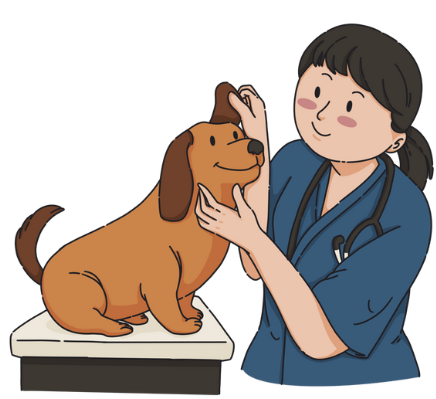The foundation of a healthy and happy dog lies in proper nutrition. A well-balanced diet plays a critical role in their overall well-being, impacting everything from energy levels to coat health.
Several factors influence dogs’ nutritional requirements:
- Age
- Size
- Breed
- Activity level
- Overall health
Understanding these elements helps pet owners make informed decisions about their dog’s diet. This article delves into the intricacies of dog nutrition, aiming to provide a comprehensive guide on how to meet your dog’s unique needs.
The Importance of Regular Vet Visits
One of the best ways to ensure your dog is receiving the right nutrition is by scheduling regular vet visits. These visits allow veterinarians to assess your dog’s health and make personalized dietary recommendations. If you’re in need of veterinary services, consider booking an appointment through our online booking system.
Tailored Nutrition Based on Specific Needs
Every dog is unique and may require specific dietary adjustments based on their individual health conditions. For instance, dogs with dental issues may need special food that is easier to chew and digest. Our clinic offers dental care services that can help address these issues.
Location Matters: Finding the Right Vet
If you’re located in Scripps Ranch and are looking for a reliable vet, our Scripps Ranch location provides comprehensive veterinary services including nutritional advice tailored to your dog’s specific needs.
Convenient Booking Options
We understand that pet owners lead busy lives, which is why we offer convenient online booking options. You can easily schedule a visit with us through our scheduling page.
Career Opportunities in Veterinary Services
If you have a passion for animals and are interested in pursuing a career in veterinary services, we invite you to explore our current career opportunities.
1. Nutritional Components Essential for Dogs
Dogs need a balanced diet that includes proteins, fats, carbohydrates, vitamins, minerals, and water. Each of these elements is crucial for their overall health.
Proteins
Proteins are vital because they provide essential amino acids that dogs can’t produce on their own. These amino acids are key for building muscles, repairing tissues, and supporting the immune system. Good sources of protein include:
- Chicken
- Beef
- Fish
- Eggs
In some cases, when dogs have nutritional deficiencies or require specific dietary changes due to health problems, soft tissue surgery may be needed.
Fats
Fats are an important source of energy and provide essential fatty acids like Omega-3 and Omega-6. These fatty acids help keep the skin and coat healthy, support brain function, and reduce inflammation. Good sources of fats include:
- Fish oil
- Flaxseed oil
- Poultry fat
Carbohydrates
While dogs primarily eat meat, they can also digest carbohydrates when cooked properly. Carbohydrates provide extra energy and contribute to good digestion through dietary fiber. Some examples of digestible carbs are:
- Rice
- Sweet potatoes
- Oats
Vitamins and Minerals
Vitamins and minerals are necessary for various body functions such as bone growth, blood clotting, vision, and immune response. It’s important to pay attention to these nutrients:
- Vitamin A: Important for vision and immune function.
- Calcium: Essential for healthy bones.
Lack of these nutrients can lead to serious health problems like stunted growth, weakened immunity, and bone issues.
In certain situations where dogs have severe health problems that require further investigation or treatment beyond dietary changes alone, exploratory surgery might be needed.
Water
Water is the most important nutrient for dogs. It helps with digestion, regulates body temperature, and gets rid of waste products. Dogs should drink about one ounce of water per pound of body weight every day.
Understanding these nutritional components ensures your dog gets a balanced diet tailored to their needs.
2. Guidelines from AAFCO and NRC
The AAFCO (Association of American Feed Control Officials) and NRC (National Research Council) are crucial in setting pet nutrition standards. They ensure that commercial pet foods meet the necessary nutritional requirements to support dogs’ health.
Roles in Pet Nutrition
- AAFCO: Provides guidelines and regulations for pet food manufacturers. Their nutrient profiles serve as a benchmark for formulating balanced diets.
- NRC: Conducts scientific research and provides detailed reports on nutrient requirements for pets based on life stages and activity levels.
Life Stage-Specific Nutrient Profiles
Both AAFCO and NRC establish nutrient profiles tailored to different life stages:
- Puppies: Higher protein and fat content to support rapid growth.
- Adult Dogs: Balanced nutrients to maintain overall health.
- Senior Dogs: Adjusted nutrients to address aging concerns like joint health and muscle maintenance.
Minimum Nutritional Standards
AAFCO sets minimum nutritional standards for commercial pet foods, ensuring they:
- Include essential amino acids, fatty acids, vitamins, and minerals.
- Meet the caloric needs specific to each life stage.
Commercial pet food labels often indicate if they meet AAFCO nutrient profiles, providing assurance that the product meets these stringent standards.
In addition to nutritional guidelines, it’s crucial for pet owners to keep their pets healthy through regular veterinary check-ups and vaccinations. For instance, pet vaccine schedules are essential in maintaining your dog’s health throughout its life stages.
3. Determining Energy Requirements
Understanding your dog’s energy needs is crucial to maintaining their health and vitality. These requirements are measured in calories and can vary significantly based on factors like life stage, activity level, and breed.
Resting Energy Requirements (RER)
Resting Energy Requirements (RER) refer to the amount of energy a dog needs at rest in a thermoneutral environment. It’s the baseline number of calories required for basic bodily functions like breathing, circulation, and cellular processes.
Calculating RER:
- The formula for calculating RER is:
- [ RER (kcal/day) = 70 \times (\text{{body weight in kg}})^{0.75} ]
- For example, a 10 kg dog would need:
- [ RER = 70 \times (10)^{0.75} \approx 400 \text{ kcal/day} ]
Maintenance Energy Requirements (MER)
Maintenance Energy Requirements (MER) take into account additional caloric needs based on activity level, growth, and overall lifestyle.
Factors affecting MER:
- Life Stages: Puppies have higher MER due to growth spurts, while senior dogs may require fewer calories.
- Activity Levels: Active dogs or working breeds will have higher energy demands compared to sedentary pets.
- Health Conditions: Dogs with specific health issues might need adjusted caloric intake.
Example MER Calculation:
- For adult dogs, MER can be estimated by multiplying RER by a factor ranging from 1.2 to 2.5 depending on their activity level.
- A moderately active dog’s MER could be calculated as: [ MER = RER \times 1.6 ]
Understanding these calculations helps tailor a diet that meets your dog’s unique energy needs. Regularly assessing their activity levels and life stage ensures they receive the right amount of calories for optimal health.
For more information on maintaining a balanced diet for your furry friend, visit our service page.
4. Life Stage Considerations in Nutritional Needs
Understanding dogs’ nutritional needs across different life stages is crucial for their overall health and well-being. Puppies, adult dogs, and senior dogs each have unique dietary requirements.
Puppies’ Nutritional Needs
Puppies require a diet rich in protein to support their rapid growth and development. Essential amino acids found in high-quality protein sources are vital for building strong muscles and tissues.
- Higher protein requirements
- Adequate fat intake for energy
- Balanced calcium and phosphorus for bone development
Adult Dogs’ Nutrition
Adult dogs need a balanced diet that maintains their health without leading to obesity. Their caloric needs depend on factors like activity level, breed, and size.
- Balanced macronutrient ratio (proteins, fats, carbohydrates)
- Sufficient vitamins and minerals for overall health
- Controlled calorie intake to prevent weight gain
Senior Dogs’ Dietary Adjustments
As dogs age, their metabolism slows down, making it essential to adjust their diet. Lower calorie diets with higher protein content help maintain muscle mass without adding extra weight.
- Lower calorie intake
- Increased protein for muscle maintenance
- Joint supplements like glucosamine and chondroitin
Each life stage comes with specific nutritional adjustments that cater to the evolving needs of your dog. Tailoring their diet accordingly ensures they remain healthy and active throughout their lives.
For more insights on puppies’ nutritional needs, check our detailed guides.
5. Breed-Specific Nutritional Considerations
Breed size significantly influences a dog’s metabolism and nutrient needs. For instance, small breeds like Chihuahuas have faster metabolisms and higher caloric needs per pound compared to larger breeds.
Special Dietary Considerations for Giant Breed Puppies
Giant breed puppies, such as Great Danes, require diets formulated to support controlled growth. Excessive calcium or calories can lead to rapid growth, causing skeletal issues.
- Protein: Moderate levels to avoid overgrowth.
- Calcium/Phosphorus Ratio: Balanced to prevent bone disorders.
- Caloric Density: Lower to ensure steady, healthy development.
This ensures they grow at a healthy rate, reducing the risk of joint problems later in life.
Understanding these breed-specific nutritional considerations helps tailor a diet that promotes optimal health and longevity.
6. Home-cooked vs Commercial Diets
Choosing between home-cooked and commercial diets for dogs involves weighing the pros and cons of homemade dog food vs commercial pet food.
Advantages of Balanced Commercial Diets
- Nutritional Completeness: Commercial dog foods are formulated to meet the stringent standards set by regulatory bodies like AAFCO. This ensures that your dog receives a balanced diet with all essential nutrients.
- Convenience: No need to measure and balance ingredients yourself. Simply follow feeding guidelines on the package.
- Consistency: Each batch of commercial food is consistent in nutrient composition, reducing the risk of dietary imbalances.
Risks Associated with Unbalanced Homemade Diets
- Nutrient Deficiencies: Home-cooked meals might lack essential vitamins and minerals if not properly planned. This can lead to health issues over time.
- Imbalance: Achieving the right balance of proteins, fats, carbohydrates, and other nutrients is challenging without proper knowledge.
- Time-consuming: Preparing homemade meals can be labor-intensive and time-consuming, adding to daily responsibilities.
Exploring how commercial diets compare with home-cooked options helps in making informed decisions about your dog’s nutrition.
7. Digestibility and Nutrient Quality
High-quality ingredients play a pivotal role in ensuring better absorption of nutrients in a dog’s diet. When ingredients are of superior quality, the nutrients they contain are more bioavailable, meaning they are easier for the dog to digest and utilize.
Importance of Protein Digestibility
- The digestibility of proteins is crucial as it determines how effectively the body can break down and absorb amino acids.
- High-quality protein sources like chicken, lamb, and fish typically offer better digestibility compared to lower-quality fillers.
Influence of Protein Quality on Dietary Requirements
- Dogs require specific amounts of essential amino acids which are best provided by high-quality proteins.
- Inferior protein sources may lead to deficiencies, even if the overall protein content appears adequate.
Understanding the importance of protein digestibility in dog diets can greatly impact your pet’s health. Ensuring that your dog’s food contains high-quality ingredients guarantees they get the most out of their meals.
8. Feeding Practices and Recommendations
Feeding your dog properly ensures they get the nutrients they need at the right times. Adult dogs typically do well with one or two meals per day. This frequency caters to their metabolic rate and helps maintain a stable energy level throughout the day.
For puppies, the story is different. Due to their rapid growth rates, they need more frequent feedings. It’s best to divide their daily food intake into three to four smaller meals. This frequent feeding helps support their high energy needs and promotes healthy development.
Feeding Frequency Recommendations:
- Adult Dogs: Once or twice daily based on their nutritional requirements.
- Puppies: Three to four times daily due to their rapid growth rates.
Regular vet check-ups help tailor these recommendations further based on individual health needs.
9. Monitoring Health and Adjusting Diets
Regular veterinary check-ups play a crucial role in assessing dogs’ dietary needs. Vets can evaluate your dog’s health status and provide tailored nutritional advice based on specific conditions. To ensure you get the best care for your pet, it’s important to understand the terms and conditions of your chosen veterinary service.
Key Areas to Monitor:
- Weight Management: Regular weigh-ins help monitor and manage weight, preventing obesity or malnutrition.
- Health Conditions: Identifying issues like allergies, digestive problems, or chronic diseases that may require dietary adjustments.
- Life Stage Changes: Adjusting diets as dogs transition from puppies to adults to seniors.
By staying proactive with vet visits, you ensure your dog’s diet remains optimal for their health and well-being. This personalized approach helps address any nutritional gaps and supports overall vitality.
For more insights into maintaining a balanced diet for your dog, explore our dog nutrition services (link removed).
In case of emergencies, remember that our facility also provides rapid, compassionate emergency care for pets in La Jolla.
Conclusion
Understanding your dog’s nutritional needs is crucial for their health and well-being. By tailoring diets according to individual circumstances such as age, breed, and activity level, you can ensure your pet receives the best possible nutrition. This approach not only supports their physical health but also enhances their overall quality of life.
Remember to regularly consult with your veterinarian to adjust diets as needed. This proactive care helps in maintaining optimal health and addressing any specific requirements.
Frequently Asked Questions
Dogs require a balanced diet that includes proteins, fats, carbohydrates, vitamins, and minerals. Proteins provide essential amino acids necessary for growth and maintenance, while fats serve as an energy source and support skin and coat health. Carbohydrates offer energy and aid in digestibility. Vitamins and minerals are crucial for various bodily functions, and water is the most vital nutrient that should be readily available.
The Association of American Feed Control Officials (AAFCO) and the National Research Council (NRC) establish guidelines for pet nutrition. They provide life stage-specific nutrient profiles and set minimum nutritional standards for commercial pet foods to ensure dogs receive adequate nutrition throughout their lives.
Energy requirements for dogs can be calculated using Resting Energy Requirements (RER) and Maintenance Energy Requirements (MER). RER is determined through specific calculations based on a dog's weight, while MER considers factors like life stage and activity level to ensure appropriate caloric intake.
Puppies require higher protein diets to support their growth and development. Adult dogs need a balanced diet to maintain their health, while senior dogs benefit from lower calorie diets with higher protein content to help maintain muscle mass as they age.
Commercial dog foods are typically formulated to meet nutritional standards, providing balanced nutrition. Homemade diets can be risky if not properly balanced, potentially leading to deficiencies. It’s important to consult with a veterinarian before choosing between these options.
Regular veterinary check-ups are crucial for assessing your dog's dietary needs based on their health status and weight management goals. Adjustments may be necessary as your dog ages or if their activity level changes, ensuring they receive optimal nutrition.
 Get $20 Off
Get $20 Off








